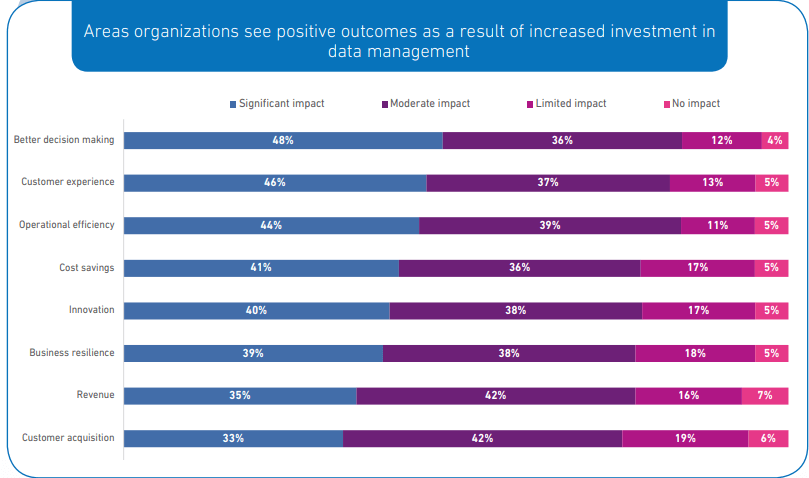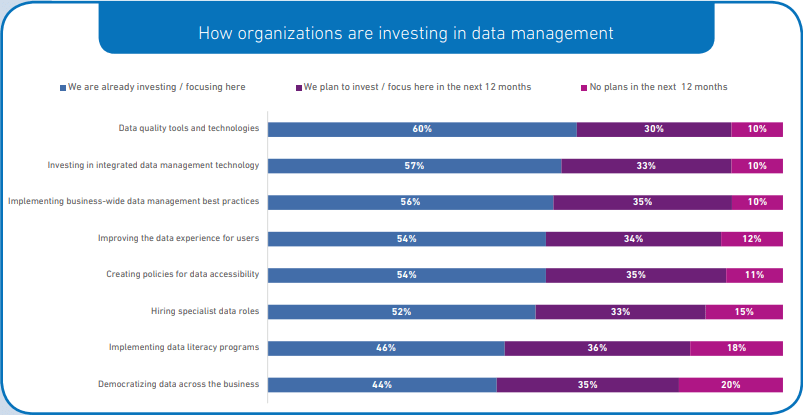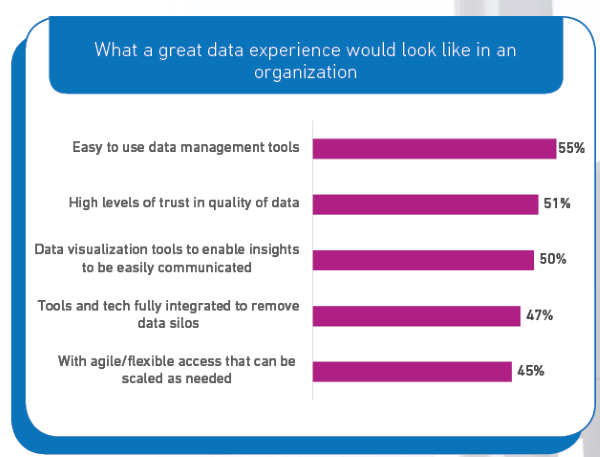- Products

Enjoy a free 30-day trial of our
data validation software.Experience the power of trusted data
solutions today, no credit card required! - Solutions

Enjoy a free 30-day trial of our
data validation software.Experience the power of trusted data
solutions today, no credit card required! - Partners

Enjoy a free 30-day trial of our
data validation software.Experience the power of trusted data
solutions today, no credit card required! - Learn more
- Pricing
- Contact Us
Experian’s 2021 Data experience research report

We have officially launched our annual research report! This year, we discover how improving the data experience is key to achieving a data-driven culture—and how organizations see data maturity impacting business growth. Surveying over 500 business leaders across the U.S., our research uncovers just how crucial data quality is today and in the future.
In this study, the data experience is defined as the data environment in which users have access to data and insights to manage and leverage for improved performance and decision-making. We find that this strategy is the backbone to encouraging a data-driven culture and, ultimately, the key to a bright future.
This past year, organizations have been faced with finding new ways to adapt to the digital-first setting, navigate economic distress, respond to consumer buying behaviors, while keeping up with the competition. Improving the data experience with trusted data and the user-friendly technology enables users to have an agile, data-informed environment to make decisions quickly.
The organizations we surveyed believe data management helped their response to the challenges COVID-10 brought their business. The proven outcome has resulted in increased investment in data management as it is critical to coming out on top competitively and financially. Interesting, right? Let’s keep reading.
We want to highlight three major findings from this year's research:
86% say they believe investing in data management directly impacts their business growth
There are many positive outcomes as a result of a data management program. At any level of maturity, organizations see benefits including better decision-making, customer experience, and operational efficiency. In a time where business leaders need to pivot strategies to keep up with the market, having access to actionable and trustworthy data makes a huge difference.
The data-mature organizations—who have an optimal and efficient data management program—are seeing increased revenue, cost savings, and innovation in addition to the benefits listed above. This has motivated them to accelerate data management programs
92% have invested in data management in the last 12 months
Of this, 56 percent are heavy investors and 36 percent are moderate investors. With data management directly impacting business development, there is an increased desire to invest more in data. Additionally, in a time where organizations are recovering and responding to the economic shock, we find that businesses are accelerating data management initiatives due to COVID-19.
Organizations are investing in data management in several ways: From data quality tools and technology, integrated data management technology, to business-wide best practices and improving the data experience for users. These areas help organizations address the three pillars to driving data maturity: technology, skills, and strategy (Keep scrolling to see the new take on data maturity!).
85% say they are increasingly focused on the data experience to become more data driven as a business.
Data experience—defined as the data environment in which users have access to data and insights to manage and leverage for improved performance and decision-making—is the strategy that underpins the journey to a data-driven culture.
A great data experience looks like this: user-friendly, data quality technology or integration that maintains a user’s trust in data while enabling agile access to insights. What goes beyond this is democratizing data and educating the workforce on data literacy skills.
PSA: A new lens on data quality maturity
We have always looked at three main areas of the data maturity curve: People, processes, and technology. Although, these continue to play a crucial part to being data driven, we find that organizations are prioritizing three new areas to address and growth their data maturity. Introducing: Technology, skills, and strategy.
· Technology: Tools can make or break the data experience—and the ability to grow data maturity. Whether it is implementing data management or contact data validation software, moving data to the cloud, or partnering with data integrations, about two-thirds of organizations are prioritizing data management tech to become more mature.
· Skills: For years, organizations have seen a huge skills gap and are challenged with teaching or hiring for data skills. Data literacy—the ability to read, write, and argue with data—is seen as a crucial area to a successful data-driven culture. Now, it’s time to address this skills gap and increase the availability of data skills across an organization.
· Strategy: Although this may seem obvious for some, for others, this area of priority is coming at the time where they have the right people in place to follow through with a robust data strategy. This can encompass technology integrations, data literacy programs, best practices, all of which level up the data experience.
To drive data maturity, organizations are taking a people-first approach by improving the data experience. Integrating user-friendly technology that inspires data-driven collaboration and promotes agile data accessibility underpins the data experience. Paired with an increased focus on developing data skills, organizations will begin stretching the impact of a data-driven culture across the business to gain a more effective competitive edge and financial stability post-pandemic.
Actionable data makes any organization—and it’s people—unstoppable. With trustworthy data, an organization has a clearer view of where they can win in an everchanging market. Today is the day to be data driven.
Read the full report to learn what you can do today to become more data mature.
